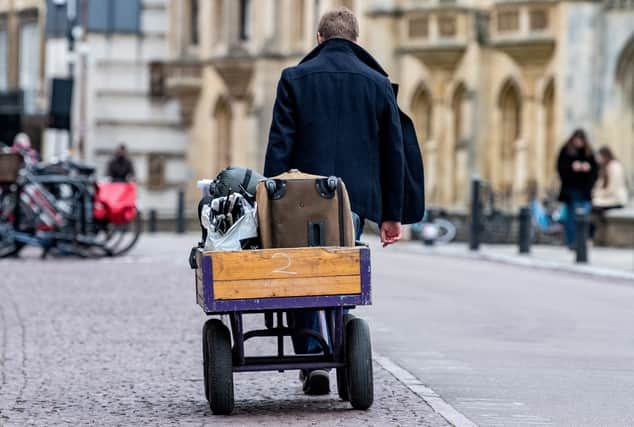Parents top worries about their children leaving home


A poll of 2,000 parents of children who have recently been to university, are currently studying or are planning to in the near future, found that while 56 per cent feel excited for their offspring as they fly the nest, 41 per cent are anxious.
And 64 per cent of those who have a child that has already left home admitted they have even lost sleep worrying about them.
Advertisement
Hide AdAdvertisement
Hide AdBut 53 per cent put these worries down to a fear that their son or daughter feels nothing bad will ever happen to them.
The research, commissioned by Bupa to support the launch of its new Family+ insurance proposition built around savings on health insurance for families, also revealed parents’ top fears for their child as they embark on life away from the family home.
These include their mental health (43 per cent), their financial situation (44 per cent), and whether they will be lonely (43 per cent).
Others worry who they will be spending time with (31 per cent), if they’ll know how to look after themselves (32 per cent) and what they’ll do when they feel unwell (23 per cent).
Advertisement
Hide AdAdvertisement
Hide AdDr Naveen Puri, spokesperson for Bupa Family+, which has launched an online guide to help those embarking on this new life stage, said: “All parents worry about their children, whatever their age.
“But it can be especially difficult when they move out for the first time and become more independent – and you are no longer nearby to help them.
“As a child and even a young adult, when you are unwell or have a health issue, your parents are often your first port of call, or even the ones spotting something is wrong in the first place.
“They are usually the ones pointing you in the right direction, sorting appointments and arranging medication you might need.
Advertisement
Hide AdAdvertisement
Hide Ad“We know moving out or going to university is both an exciting and daunting time for all the family and we hope our new Family+ cover, which also insures older children, will help provide peace of mind to parents and their children alike.”


The tools they need
The study also found that ahead of them moving out, 63 per cent of parents will teach them how to manage their finances, while 59 per cent give tips on how to cook healthy meals.
Others show their child how to use a washing machine (56 per cent), how to drink responsibly (40 per cent) and how to deal with mental health concerns (43 per cent).
However, if their child was feeling unwell, 55 per cent reckon they would still be the first port of call for help or advice, despite no longer living under the same roof.
Advertisement
Hide AdAdvertisement
Hide AdJust 13 per cent think a local doctor would be the person their son or daughter turned to, while 12 per cent reckon they would head online for advice.
More than one in 10 (12 per cent) even think their youngster would head home to be looked after until they were well again, while seven per cent worry they would simply hope they recover without advice or medical attention.
The study, carried out via OnePoll, also revealed girls are considered more likely to take care of their physical (43 per cent) and mental (41 per cent) health than boys (13 per cent and 11 per cent).
Dr Naveen Puri, GP and spokesperson for Bupa Family+, where insuring the older child up to the age of 20 results in free cover for any younger children, said: “Our health is so important, and it can be worrying for parents that their child may be unwell when they aren’t there to help.
Advertisement
Hide AdAdvertisement
Hide Ad“Making sure they have the knowledge about what to do in different health situations is a great way of not only ensuring they can look after themselves, but also allows you to relax a little knowing they have the tools they need.”
Parents' top worries about their children leaving home
- They won’t be able to afford it (44 per cent)
- They will be lonely away from home (43 per cent)
- Their mental health (43 per cent)
- They won’t eat a healthy/ balanced diet (38 per cent)
- They’ll make friends with people who are a bad influence (34 per cent)
- They won’t know how to look after themselves in key ways, such as cooking or doing laundry (32 per cent)
- You don’t know who they’ll be spending time with (31 per cent)
- They won’t spend enough time studying (29 per cent)
- They won’t get enough sleep (27 per cent)
- You'll be lonely at home without them (26 per cent)
- They won’t make any friends (24 per cent)
- They wouldn’t know what to do if they became unwell (23 per cent)
- They might ignore physical health warnings that could be serious (23 per cent)
- They’ll get too drunk be unwell (17 per cent)
- They won't have regular medical appointments like, eye tests, seeing the dentist etc. (15 per cent)
- They might have problems with drugs (13 per cent)
- They might have problems with alcohol (13 per cent)
- They may injure themselves (12 per cent)
- They may get pregnant/get someone pregnant (10 per cent)
- They won't exercise (nine per cent)
Comment Guidelines
National World encourages reader discussion on our stories. User feedback, insights and back-and-forth exchanges add a rich layer of context to reporting. Please review our Community Guidelines before commenting.